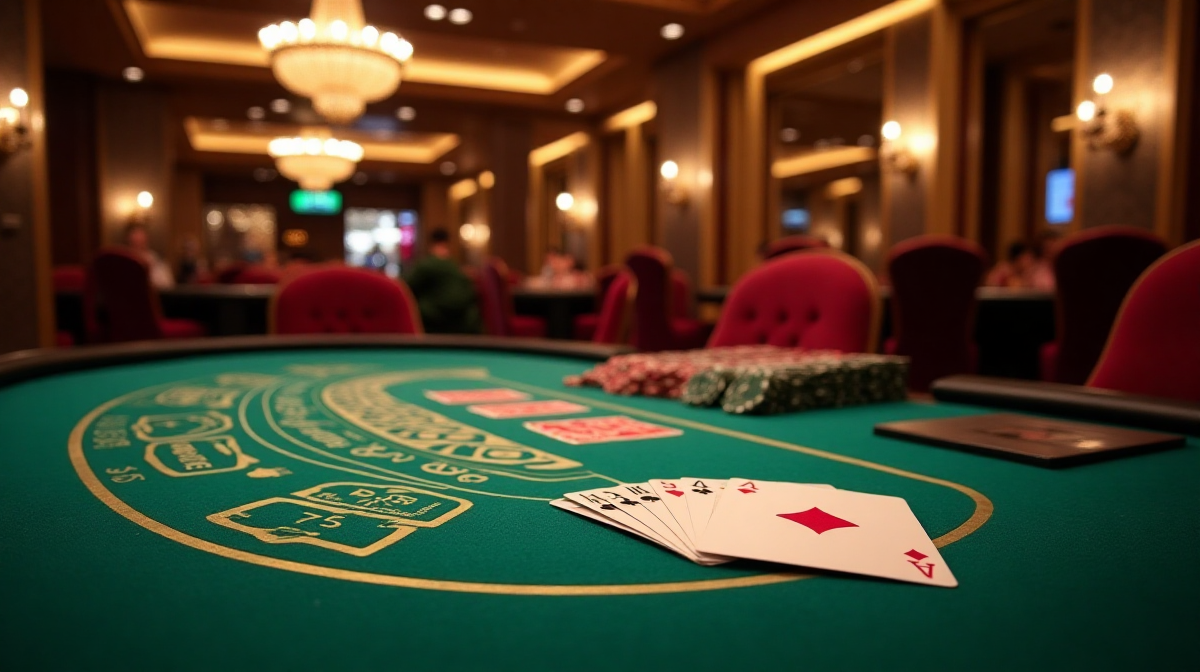Blackjack Rules: Master the Game Now?
What is Blackjack and Why is it Popular?
Blackjack, also known as 21, is one of the most beloved casino games worldwide, steeped in history and offering a compelling blend of skill and chance. Its enduring popularity stems from its relatively simple rules combined with the potential for strategic play – unlike many casino games, players can actively influence their outcome. Many are also drawn to the excitement surrounding options like a turkey bet, adding another layer of engagement.
Briefly Mention the Goal of the Game
The primary goal of blackjack is to beat the dealer’s hand without exceeding 21. You achieve this by having a hand value higher than the dealer’s, or by letting the dealer exceed 21 while you remain at or below.
Dispelling Myths: Blackjack Isn't Just Luck
While luck certainly plays a role, blackjack is far from a purely random game. Employing a basic strategy significantly reduces the house edge, and skilled players can gain a definite advantage. Even contributing to side bets like a turkey bet requires understanding the probabilities.
Core Gameplay & Rules
The Deck & Card Values
Understanding Standard Deck Composition
A standard blackjack game uses multiple decks of 52 cards. Most casinos utilize 6 or 8 decks to complicate card counting.
Card Values: Ace, 2-10, Jack, Queen, King.
Number cards (2-10) retain their face value. Face cards (Jack, Queen, King) are each worth 10. An Ace can be worth 1 or 11, depending on which value benefits the hand the most. This flexibility is key to optimal play. Understanding the card values is crucial for any turkey-bet strategy.
The Deal & Initial Actions
Player and Dealer Actions – Step-by-Step
The game begins with players placing their bets. The dealer then deals two cards face up to each player and two cards to themselves – one face up and one face down. Players then evaluate their hands and decide on their next action.
Understanding the Betting Process Before Cards are Dealt
Before any cards are dealt, players must place their wager. Many casinos now offer additional wagers, like a turkey bet, which acts as a side bet related to specific hand combinations.
“Hit” or “Stand”? The Core Decision
Explaining “Hit”
“Hit” means requesting an additional card. You choose to hit when you want to improve your hand value, but risk exceeding 21.
Explaining “Stand”
“Stand” means declining any further cards. You choose to stand when you are satisfied with your hand and believe it is strong enough to win.
When to Hit vs. When to Stand – Basic Guidance
A general guideline is to hit when your hand totals 11 or less, and to stand when your hand totals 17 or more. However, this is a simplified view; a proper basic strategy chart is essential for informed decision-making. Careful consideration is important even when deciding to participate in a turkey bet.
Busting & Dealer's Play
What Does Bust Mean?
“Bust” means exceeding a hand value of 21. If you bust, you automatically lose your bet, regardless of the dealer’s hand.
Dealer’s Rules (Hitting on 16, Standing on 17 - variations)
The dealer follows a strict set of rules. Typically, the dealer must hit if their hand totals 16 or less and stand on 17 or more. Some casinos require the dealer to hit on a soft 17 (a hand containing an Ace counted as 11).
Special Actions & Scenarios
Doubling Down
When is Doubling Down Advantageous?
Doubling down allows you to double your initial bet in exchange for receiving only one additional card. This is advantageous when you have a strong starting hand (like 11) and believe one more card will give you a winning hand.
Rules Regarding Doubling Down
Most casinos allow doubling down on any two cards, but some have restrictions.
Splitting Pairs
When to Split - Common Pair Scenarios (Aces, 8s, etc.)
Splitting pairs allows you to divide a pair of cards into two separate hands, each with a bet equal to your original wager. Splitting Aces or 8s is generally recommended, while splitting 10s is often discouraged.
Rules Regarding Splitting
Casinos may limit the number of times you can split a hand.
Insurance & Surrender
What is Insurance and When to (Not) Take It
Insurance is offered when the dealer's upcard is an Ace. It's a side bet that the dealer has blackjack. Statistically, insurance is generally a poor bet. Don't fall for it! You should consider your chances when assessing a blackjack game.
Understanding Surrender (if offered) – Early vs. Late
Surrender allows you to forfeit your hand and receive half of your bet back. Early surrender (before the dealer checks for blackjack) is rare, while late surrender (after the dealer checks) is more common.
Blackjack Payouts & Winning Hands
Standard Payouts
Winning Hands: 21, Blackjacks
A winning hand is one that is higher than the dealer’s without exceeding 21.
Losing Hands: Busting, Lower Total than Dealer
If you bust or have a lower total than the dealer, you lose your bet.
Push (Tie) - What Happens?
A push occurs when you and the dealer have the same hand value. Your bet is returned.
What is a Blackjack (Natural)?
Payout for a Blackjack (3:2 generally)
A blackjack is an Ace and a 10-value card, totaling 21. A blackjack typically pays 3:2 (e.g., a 15). This payout is a key reason to aim for a blackjack game.
Dealer Blackjack Rules & Situations
If the dealer gets a blackjack and you don't, you lose. If both you and the dealer get blackjack, it’s a push.

Basic Blackjack Strategy – Getting an Edge
Introduction to Basic Strategy
Why Basic Strategy Works (reducing house edge)
Basic strategy is a mathematically derived set of rules that tells you the optimal action to take in every possible situation. It significantly reduces the house edge.
Simple Basic Strategy Charts (Example - Hard Hands)
Charts provide a quick reference for what to do based on your hand and the dealer's upcard.
Basic Strategy for Soft Hands (Aces)
Soft hands (containing an Ace counted as 11) require a different strategy due to the Ace’s flexibility.
Basic Strategy for Pairs
Splitting pairs is a strategic decision that’s heavily influenced by the dealer's upcard. Many players will factor this into making a turkey bet as well.
Common Blackjack Variations
Single Deck vs. Multiple Deck Blackjack
Single-deck blackjack generally offers the best odds for players, but is less common. Multiple-deck blackjack is more prevalent in casinos.
Spanish 21 (brief overview)
Spanish 21 uses a 48-card deck (no 10s) and includes special rules that alter gameplay.
Other Popular Variations (Pontoon, etc. – mention briefly)
Other variations like Pontoon and Blackjack Switch offer unique twists on the classic game.
Etiquette & Tips for the Casino (or Online)
Casino Etiquette: Behavior at the Table
Know basic casino etiquette – avoid touching cards, don't distract other players, and tip the dealer when appropriate.
Responsible Gambling
Gamble responsibly and set limits for yourself.
Finding Reputable Blackjack Games (Online & Offline)
Choose casinos with a good reputation and fair gaming practices.

Conclusion: Practice Makes Perfect
Recap of Key Rules
Remember the core rules: aim for 21 without busting, understand card values, and utilize basic strategy.
Where to Find More Resources (links to strategy charts, practice games)
Numerous online resources offer basic strategy charts and practice blackjack games.
Encouragement to Practice & Improve
Blackjack is a skill-based game, and practice is essential for improvement. The more you play, the better you’ll understand the strategies and increase your chances of winning – even when considering a side wager like a turkey bet.

